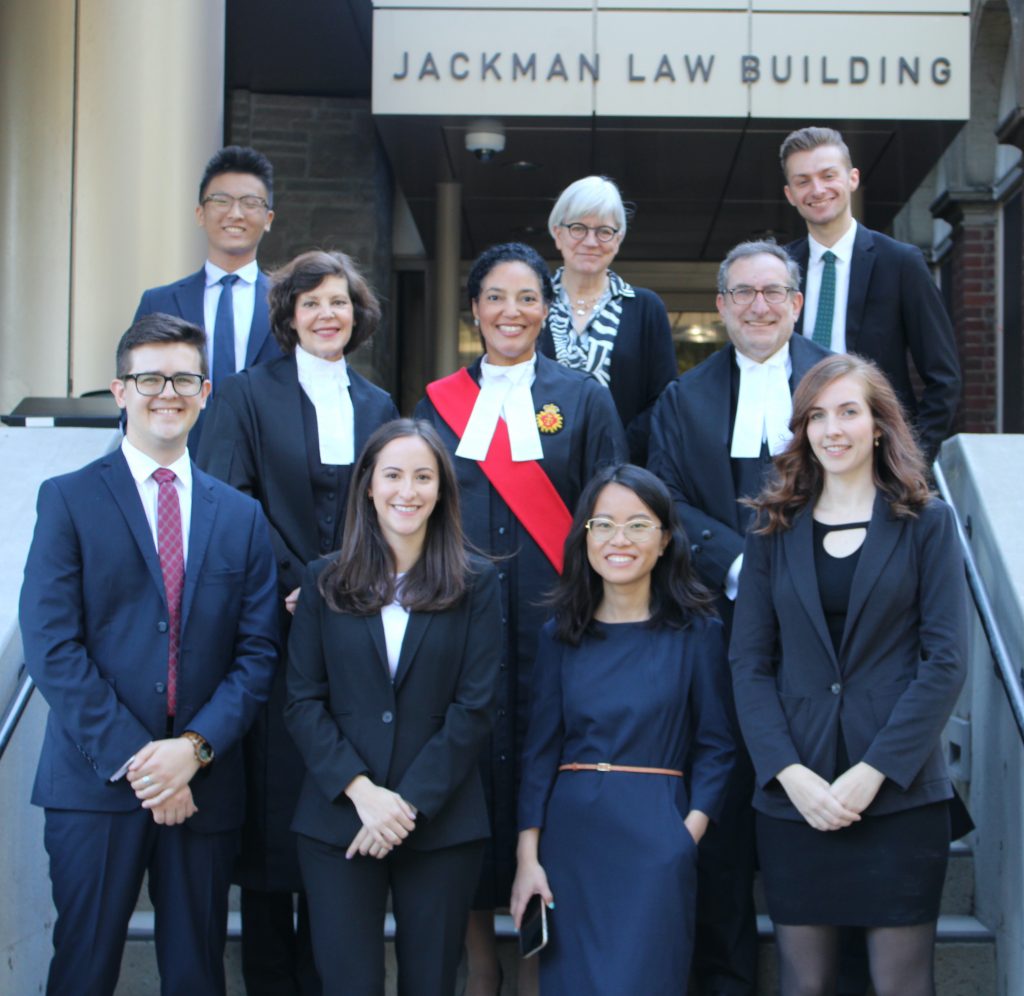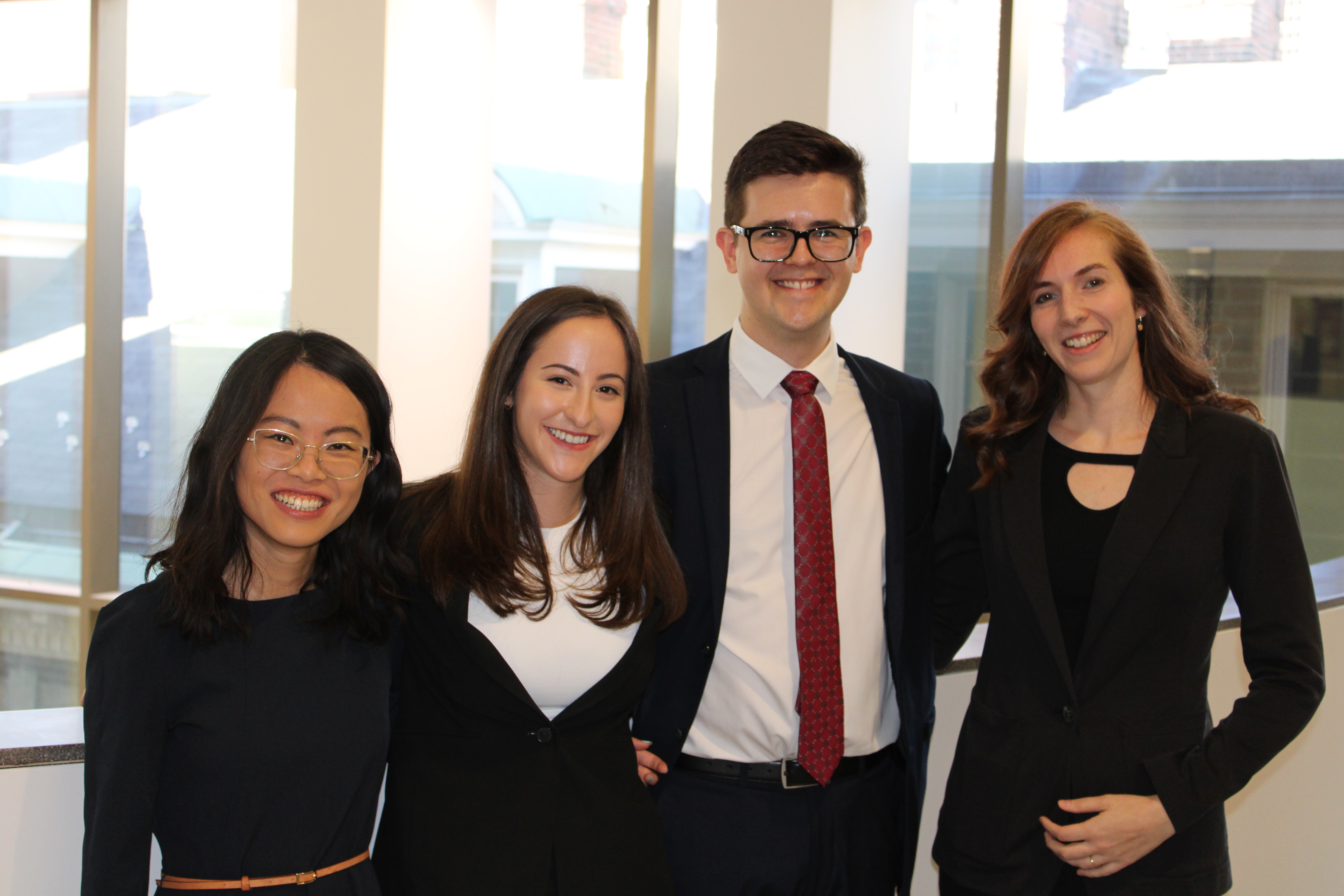Mooters considered freedom of expression and equality concerns in social media regulations
Another year, another Grand Moot! This year, the mooters addressed the constitutionality of a law that regulates privately held social media platforms. In deciding whether ChitChat, a platform similar to Twitter, must adhere to a law prohibiting viewpoint-based content moderation, the mooters were asked to consider potential infringements under sections 2(b) and 15 of the Canadian Charter of Rights and Freedoms (the Charter).
Benjamin MacLean-Max (2L) and Laura Goldfarb (3L) represented the appellant, ChitChat, while Ivy Xu (3L) and Adrianna Mills (3L) represented the respondent, the federal government. The distinguished panel consisted of the Honourable Justice Rita J. Maxwell from the Ontario Superior Court of Justice and the Honourable Justices Lorne Sossin and Julie Thorburn from the Court of Appeal for Ontario.

The problem was written by the Moot Court Committee Co-Chief Justices, Charles Ma (3L) and Mackenzie Faulkner (3L). In their drafting, they were inspired by the recent First Amendment challenges to social media regulations in Texas and Florida.
“Building on this basic idea, we structured the problem to incorporate contemporary debates about social media’s role in democratic discourse, as well as competing conceptions of free expression,” commented Ma and Faulkner. “We included the s. 15 element as a novel application of the [Fraser v. Canada (Attorney General), 2020 SCC 28] adverse effects discrimination framework and to explore the relationship between free expression and equality rights.”
The appellant argued that limiting the platform’s ability to censor content it deems problematic violates its right to free expression. “Hosting content is a form of expression,” MacLean-Max claimed in his oral submissions.
In response, Justices Maxwell and Sossin drew the distinction between association and attribution, questioning whether ChitChat could experience compelled speech when it really acts as a forum for others’ speech.
On the section 15 argument, the appellant claimed the impugned law creates a discriminatory distinction of race, religion, sexual orientation, and gender identity by preserving discriminatory content that targets those groups.
Switching sides, the respondent argued that section 2(b) does not protect censorship on social media. In the alternative, even if the law does protect such censorship, it does not restrict ChitChat’s expression in purpose or effect. Indeed, the law could be considered to uphold the values underpinning freedom of expression, by ensuring private actors cannot unduly influence public discourse.
“The point here is that there is no accountability mechanism to ensure that all platforms exercise good faith,” argued Xu in her oral submissions. “There is nothing to ensure that ChitChat itself doesn’t change its moderation policy. In fact, it could be under the threat of a hostile takeover tomorrow, by a certain billionaire who makes rockets and electric cars and has a very particular view of what public discourse should [look] like.”
The judges pushed back on the respondent’s assertion that content moderation is not sufficiently expressive to enter within the scope of section 2(b) protection. Justice Sossin noted that advertising and other forms of corporate speech are covered under section 2(b), and that the Supreme Court’s decision in Irwin Toy Ltd. v. Quebec (Attorney General) set a very low threshold for what constitutes expressive activity.
The respondent also argued that the law does not infringe section 15, citing a lack of causation between the claimed harm and the law. It could not be shown that permitting content moderation, contrary to the law, would make a meaningful difference to those cited by the appellant as being negatively impaired.
“One of the benefits of speaking last today—probably the only benefit—is that this Court has heard examples of both positive and negative forms of censorship. And there is nothing about censorship that is inherently beneficial for minority groups,” argued Mills.
Upholding the Grand Moot tradition, there are no losers and only winners in the Supreme Court of Flavelle. The judges lauded the mooters’ performances and ability to field their questions, with Justice Maxwell reflecting that as a previous Grand Mooter herself, she was extremely impressed by the students.
In addition to commending the oral advocacy on display, the judges also praised the problem for its contemporaneousness. In their comment to Ultra Vires, Ma and Faulkner noted that should this issue reach Canadian shores, they hope the problem “serves to inform students’ perspectives on this challenging question.”
The mooters provided some words of encouragement for their peers. Xu emphasized taking risks, noting that “in a moot, no one is going to jail, and there is no money on the line.” She explained that mooting allows students to experiment with different arguments and advocacy styles in a relatively low-stakes environment that is not possible in real practice. She revealed that she even reframed a key part of her submissions on the morning of the moot, “which was probably the 10th version of it!”
Goldfarb also enjoyed her experience, noting that mooting provides students with the opportunity to think more deeply about legal issues than what classes can provide.
“I loved thinking through complex issues of free speech, censorship, and equality alongside my teammates and with the help of many brilliant faculty members and lawyers,” commented Goldfarb. “For all those interested in mooting, the best advice I ever got was this: it’s always better to sound reasonable than to sound clever, and preparation always wins.”
The Grand Moot is a U of T Law tradition showcasing the school’s top oralists. It is sponsored annually by McCarthy Tétrault LLP.
“As a firm with a continuing tradition of excellence in advocacy, McCarthy Tétrault takes great pleasure in sponsoring the Grand Moot each year,” commented a spokesperson for McCarthy. “This event fosters and showcases the potential and development of the next generation of advocates. This year’s Grand Mooters thoroughly impressed us with their preparation, thoughtfulness, and ability to respond to difficult questions from the bench.”






